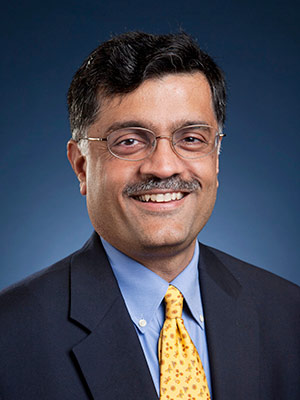Expert: Response to Pandemic Speeds, Shifts Latest Industrial Revolution

So what is COVID-19 doing to the Fourth Industrial Revolution — aka "Industry 4.0," the one spurred by the rise and proliferation of a many-tentacled internet? Well, accelerating and reordering it, according to Venkat Ramaswamy, a marketing professor at the University of Michigan's Ross School of Business.
Ramaswamy recently spoke at U-M's 20th annual Celebrate Invention conference. His talk on "Becoming a Living Enterprise in a Post-COVID world of Industry 4.0 Value Creation" stemmed from his ongoing research, authorship of books and presentations on "experience innovation and lived value co-creation," or the rise of individual, interactive relations between consumers and companies based on lived experiences.
Ramaswamy discusses what's changing now and what he sees in the decade ahead.

As hard as it might seem to believe right now, there will come a time after COVID-19. Celebrate Invention conference participants are asked to look beyond it and imagine what the business world might look like in 2030. What are some of the most noteworthy changes you envision in the business and consumer spheres?
Ramaswamy: They are similar: the "de-centering" and "democratization" of value creation. What I mean by the former is the shift toward experiences of individuals, arising from interactions in a hyperconnected world and increasingly powered by digital platforms. As this happens more, it also requires opening up processes of value creation to individuals as stakeholders.
This goes beyond the "B2B2C" (business-to-business-to-
So the pandemic is not only speeding but changing the Fourth Industrial Revolution by putting a much greater emphasis on individuals and their experiences with a product or service. Can you elaborate on what that looks like or how it's manifesting itself?
Ramaswamy: Think about the first three industrial revolutions: The first was powered by water and steam in the revolution of mechanization, then electric power in the second, and computer power in the third. While today we have cloud computing and smart, connected devices from mobile phones to the Internet of Things on the one hand, we also have social media and the Internet of People on the other hand who are connected and active in their own ways.
The Fourth Industrial Revolution, then, is about how we effectively harness the power of interactive intelligence in the daily lives of people that augment value in ways not possible before. Take education, for instance. While we are involved in remote learning with Zoom and the like, it is shifting the traditional system of teaching toward learning experiences. What was the "edge" is becoming "core" to a more learner-centered approach to educational value creation. More broadly, it is about innovating new forms of experienced value through I2N2I ecosystems in the lived journeys of individuals.
You paint a picture of corporations, such as Microsoft, heeding the call and becoming successful "living enterprises." What does that mean and why is that important? Any downsides, such as increased security or privacy risks?
Ramaswamy: In the next decade, every enterprise has to become a "living enterprise" if it is to thrive. By that I mean organizations will have to engage with all their stakeholders through digital interactive platforms in their respective experience ecosystems to innovate offerings that drive valuable impacts of economic, social and environmental well-being, which are developmentally sustainable.
The COVID crisis has only accentuated the intersection of lives and livelihoods in how we create value moving forward. And it is not just about the health care sector, where for instance, Microsoft's Cloud for Healthcare offering positively affected more than 30 million people in over 20 countries by reducing the strain on emergency hotlines and hospital visits through service bots and telehealth interfaces, followed by escalated caregiving triaging with nurse practitioners and physicians in acute cases. While Microsoft's vision is to empower every individual and organization on the planet to achieve more, digital transformation of business got accelerated from two years to two months, according to Satya Nadella, CEO of Microsoft.
Every company has to think about what such a digitalized transformation means for them, as "software" pervades their value chain. And yes, in doing so they must manage and mitigate security and privacy risks. Trust, which has in general eroded, must be earned, in becoming a successful living enterprise. In Microsoft's case, its platform offerings leverage the confluence of sensors, from Big Data, cloud computing, computer vision and cognitive computing to robotics, augmented reality and virtual reality, with artificial intelligence powering every experience and augmenting human capabilities with insights and predictive power. It works together with its partner ecosystem, and with customers and other stakeholders, while drawing on its own internal organizational use of offerings and employee experiences. It intends to become carbon negative by 2030. Similarly, every enterprise has to, and is, figuring out for itself what the new age of lived journey value creation means for them through digitalized ecosystems, platform offerings, interactive experiences and sustainable impacts.
Is there anything else important to know about the future of business as it relates to what we're living through now?
Ramaswamy: Yes, following up where we just left off, to become a successful living enterprise requires embracing a mindset of "co-creation," one that is purpose-built. As Alan Murray, the editor of Fortune magazine noted recently, CEOs are now "genuinely struggling with their role at a time when employees, customers, investors and society are demanding ever more of them." They have to innovate governance systems that combine access, transparency, dialogue and insights in new ways to innovate together with the experiencers of their value propositions. Enterprises themselves must be configured as I2N2I experience ecosystems to create positive impacts at scale, not just their offerings. This entails a transformative shift in how we organize ourselves—not only in becoming more resilient and adaptive but anticipating a better future by co-creating it.







